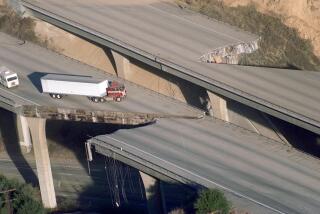Quake specialist taught at Stanford
- Share via
C. Allin Cornell, 69, a Stanford University professor whose pioneering earthquake research focused on seismic hazards, died Dec. 14 at Stanford Hospital in Palo Alto after a long battle with cancer, the university announced.
He wrote a seminal research paper in 1968, titled “Engineering Seismic Risk Analysis,” that marked a leap in scientists’ ability to quantify the risks and hazards of earthquakes, the university said.
Cornell studied primarily seismic hazards -- the probability of a certain degree of ground movement at a particular spot -- and seismic risk, usually measured in terms of dollars or lives lost. He advised the U.S. Geological Survey on its seismic hazard maps. He also was known for studying the risk to offshore oil platforms from earthquakes, strong winds and waves.
Carl Allin Cornell was born in 1938 in Mobridge, S.D. At Stanford, he earned an undergraduate degree in architecture and a master’s and doctorate in civil engineering. He was on the Massachusetts Institute of Technology faculty from 1966 to 1983 before returning to Stanford as a research professor.
He was the father of Eric Cornell, also a Stanford graduate, who shared the 2001 Nobel Prize for physics for creating a new kind of matter.
More to Read
Sign up for Essential California
The most important California stories and recommendations in your inbox every morning.
You may occasionally receive promotional content from the Los Angeles Times.













